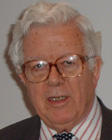A Quarter Century of Improving Sino-British Relations
Geoffrey Howe, the Lord of Aberavon CH QC (Former British Deputy Prime Minister and Foreign Minister)
J. Sean Curtin (GLOCOM, Fellow and Asia Times)
In this article Geoffrey Howe gives some personal reflections on the development of Sino-British relations from 1978 to the present day, focusing on the Chinese legal system and the return of Hong Kong to mainland China.
 Geoffrey Howe, the Lord of Aberavon CH QC: Geoffrey Howe, the Lord of Aberavon CH QC:
I well remember my first visit to China in 1978, when the Cultural Revolution was hardly behind us. I was there to learn about China as a guest of the Chinese government. One of the things we wanted to find out was if there was a legal system. We were able to find three rather desperate looking Chinese academic lawyers, starting afresh at the law faculty of Beijing University.
We wanted to see a Chinese court and on our last day were able to find a criminal court in Shanghai. We went into this building. There was nothing going on, but there were two chaps in short-white sleeves there. In fact, frankly I thought they were the janitors. Eventually, I thought I should ask them who they were and what they were. They turned out to be the judges. So, we asked them what their qualifications were and they said they were retired generals. I then asked them if they had ever had any officials in their court, they rubbed their chins and said, "No, I don't think we have."
Now this story is not a caricature of the China that was emerging from the Cultural Revolution. Many of those who know China well will remember the physical circumstances like the third-world road from Beijing Airport to the city. Now, if you go back there today, the transformation is astonishing…It has been a transformation not in just economic terms and living conditions, but also in terms of thinking.
My next series of visits were in connection with the negotiations for the Hong Kong agreement. It was a huge privilege and pleasure to conduct those negotiations with that astonishing dynamo Deng Xiaoping, whose insight into what China needed in the future was amazing and hugely impressive.
For China, the description, "One China, two systems" was a prescription which it was offering not just for Hong Kong, but also for Korea – it is still waiting to implement it there – for Germany where they have found a different solution. It inspired all the marketization that has taken place in China since that time.
I don't think I do injustice to the English language if I said that the toast I proposed at the end of the negotiations, as we looked forward to the implementation of the Hong Kong agreement, in place of "one country, two systems," I now prefer to say "two teams, one goal." That is what we were able to fulfill in implementing the Hong Kong agreement. In many ways, it speaks for the nature of the Anglo-Chinese relationship now as we share so many objectives.
Deng Xiaoping inspired all the changes that have happened. He also precipitated what I call the end of China's economic exile. China had been cut off from the world economically and cut off in many other ways at that time.
Yet, it wasn't the true China. I remember being reminded of the majesty, the scale of Chinese culture at the end of the Hong Kong negotiations. Deng Xiaoping said to me, "Now we have reached this agreement, we have decided we can trust the British people and the British government. I would like you to convey an invitation to your Prime Minister Mrs. [Margaret] Thatcher to come to sign the agreement and for your Queen [Elizabeth II] to come to make a state visit to China as soon as possible."
That did happen in 1986 and we were able to see the tremendous pace of change at that time.
What he also reminded me of when he made that gesture was, of course, the history of China. I felt at the moment that he extended that invitation that I was in the position of a medieval traveller from Europe being welcomed by a Chinese Emperor. I was reminded of the scale of the Chinese empire starting 2000 years before Christ and once again resurgent that it teaches one quite a lot about the passion and pace of Chinese history.
The above comments were made at a China Connect Event at PricewaterhouseCoopers Embankment offices in London on 16 March 2004.
Profile: Rt Hon Geoffrey Howe, the Lord of Aberavon CH QC
Lord Howe served as a senior Cabinet minister during nearly all of former Prime Minister Margaret Thatcher's term in office. He was Finance Minister (Chancellor of the Exchequer) for four years (1979-83), Foreign Minister for six years (1983-89) and Deputy Prime Minister for two years (1989-9O). He is currently President of the Great Britain-China Centre.
| 




